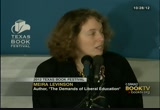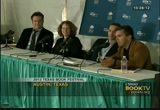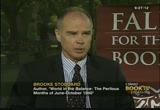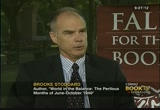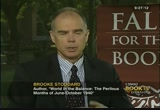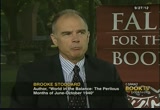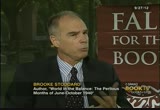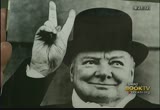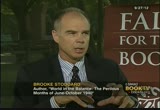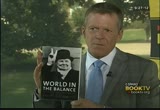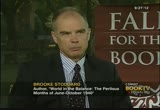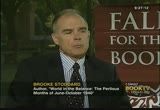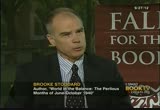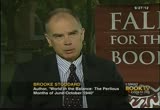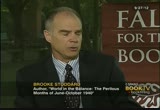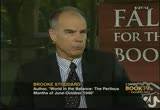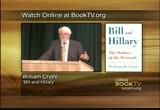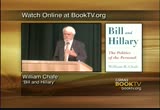tv Book TV CSPAN November 12, 2012 7:30am-8:00am EST
7:30 am
students of color and those are the students at the bottom of the civic empowerment gap and it would be in the democratic party's self-interest to take a generation of young people land have them practice being citizens day after day. they would support the democratic party but on the other hand if romney wins i think actually he might have an interest also in supporting civic education because right now what we know is low-income kids of color are likely to grow up in devoe the democratic so he could have some impact in actual the teachings and civics that might get them thinking beyond what their context is likely to teach them. they should promote civic education. [applause] >> the reason is hard to get jerry springer out of this is this is our only bipartisan issue. everybody cares about it. everybody has been on the same side dating back to ted kennedy
7:31 am
and george bush. there are a lot of reasons the election is important. they ton either candidate will take in office will affect what happens with education. >> paul, you wrote in the new york times magazine the obama before he was elected and the obama in the white house having different towns about posture. using the changes if he gets a second term? goes back to the tone he had before? >> i wrote about his policies around poverty and he stopped talking about poverty the last couple years. i would like to think he would go back to poverty in 2007. ..
7:32 am
>> the low-income population grew 71%. the english language learning population grew 169%. these are the issues we have to address in this state. thank you all for joining us up. [laughter] >> this event took place at the 17th annual texas book festival in austin, texas. for more information about the festival visit texasbookfestival.org. >> brooke stoddard joined booktv at george mason university in virginia to talk about his book, "world in the balance." mr. stoddard was one of the authors appearing at the fall for the book festival, held annually at the university. this is just under half an hour.
7:33 am
>> and you're watching booktv tv on c-span2. we are on location at george mason university. university. every fall for the book festival called fall for the book. one of the authors who was speaking at the book festival is brooke stoddard, and here he is this book, "world in the balance: the perilous months of june-october 1940". brooke stoddard, world war ii started about six months prior to your book. what was happening in europe in june 1940? >> the war had started in september 1939, peter, and germany had overrun poland. hitler's idea at this point was to invade france and knock britain out of the war thereby. with the intent later on to invade the soviet union. he hated communism. this is one thing that was really part of his agenda.
7:34 am
he was actually going to invade france in the wintertime, in november-december. he had to put that off because -- >> of 1939? >> 1939. because of the invasion plans fell into the hands of the french and the british, so we put off the invasion until may and he came up with a new plan. the old plan actually have been similar to world war i. it was going to come through belgium along the channel coast, and down into paris. buddy had to completely rearrange that andy came up with the idea -- one of his generals -- to think through belgium but send the majority of his armored power through the ardennes forest further south and come further behind any french and british armies that went to belgium once the war started.
7:35 am
and this worked perfectly, beginning may 10, 1940.s? and the british and the frenchv did what the germans expected. as soon as the germans when into belgium, the french and the british went out, the armored divisions came in behind, and forced really the cream of the french army and the british expeditionary force up to the port of dunkirk. that's what we know as the evacuation of dunkirk. speak before you go any further, when did the british come across the channel into france? >> i think they must have done this maybe even as early as 1938, but certainly after war in 1939 started. they put the british army next to the french in anticipation of the germans coming. of course, vineland through the lowlands in belgium. so the british army was there in
7:36 am
place. and it was really the best that they had, so the fact that they were pushed to dunkirk and forced to be back with -- >> which is on the channel. >> it's on the channel, was a tremendous blow to the british and to the french. the british of course had to leave the continent across the channel, and the french were then crippled in defense of paris. part of the problem with the dunkirk evacuation by the british was that the left all of their equipment in france. they had no time to take their guns, their tanks, their drugs. so that when the british soldiers ended up in southern england after the evacuation they really only had uniforms on the back. >> when did that evacuation take place? >> it was late may, and finished
7:37 am
-- >> late may of 1940? >> the first couple days of june. by the second of june it was virtually over. >> the couple of weeks into the invasion of france, it was over? >> the french, a lot of the french military felt that they had lost the battle for their country by this time. it actually went on for another several weeks, because the germans had to fit their tanks tanks and align themselves and pushed them towards paris. they hadn't at this point comfort of paris, but the french did the best they could. but at this point, the writing was certainly on the wall. france had to drop out of the war. i think it was june 22. so the evacuation was over i the second of june. there was really another two or three weeks to go in france. >> so how do that evacuation from dunkirk take place?
7:38 am
what happened to? >> as i said, the german plan worked very, very well. themselves at how quickly things happened. and in the first part of the attack, the british and the french thought they could contain it, but the germans were moving so swiftly in there was considerable amount of chaos among the allied armies that they soon realized they had to fall back on the channel ports. now, it's my supposition, i haven't seen this anywhere, but the german army mindset is that when you were pushed against an ocean, you're finished your but the british are an island nation so when they're pushed against an ocean, they see a highway, a path. they don't see it as a barrier. and, of course, the dunkirk
7:39 am
evacuation, although yachts and the fairies, and this is true. it came out and they took soldiers back to england. it was about a 20-mile trip at its shortest. when it looked like evacuation was going to start, churchill told the king, we will be lucky if we did about 17,000 soldiers back. that's the way it looked. >> out of? >> about a half million, 500,000 french and british. instead of 17,000, they got about 340,000 men back to britain. a number of these were french who then went right back to france to help with the defense of other parts of france. but that's what is called the miracle of dunkirk. they thought it was going to be much, much worse than it was, but they were lucky spent brooke
7:40 am
stoddard, your book will focus on june to october of 1940. >> yes. >> after the evacuation from dunkirk, what happened? does hitler attack a britain at that point? to the british fight back? what? >> the germans followed her plan, and maybe that was a mistake. at least one german general, and i think even hermann goering said at the time of dunkirk, let's forget about paris for a little while. let's put as many troops as we can into england. fly them over there, sees the airfields. the shock might be so great that the british government will cave in or negotiate with us. instead, what the germans did was come of course they stop at the ocean, then they turned
7:41 am
south and he wanted to knock france out of the war, which is what they did. they enter the paris on june 16, i think. the government in paris led to the south. they were practically in a different city every day. and churchill hoped and pleaded with the french to continue fighting. both countries had pledged, one to another, that they would not drop out of the war and make a separate peace, unless they were released from this pledge by the other. the french begin to think that they would want to make a separate peace, and they began to talk to the british about this. churchill said no, we can't release you from that pledge. we want you to keep fighting all the way down to the mediterranean if you have to. and if you have to, across the mediterranean, keep fighting from north africa. and a big part of the reason was
7:42 am
that the french fleet was a very, very large fleet, many battleships. it was the fourth largest navy in the world. and churchill was very worried that if france was conquered, then hitler would seize the french fleet. and the arithmetic was, if you put the german fleet, which was considerable, they had the bismarck coming along, together with italian fleet which was an ally of the germans and at a considerable in the mediterranean, if you can put that together with the french fleet which was the fourth largest fleet in the world, now you have a navy that was larger than the british fleet. and if that happened, it's game, set and match for britain. they could have controlled the sea lanes for the island. it was going to be over. so churchill implored them to keep fighting because he was worried about the french battleships.
7:43 am
in disarray, very overwhelmingly conquered. and a certain element in france decided it was better to try to come to an agreement with the germans about how they could then drop out of the war. and an interesting little tale is that when, when this element began to grow in france, because the government was flying and it was very chaotic and france was saying we need to drop out, we need to make an accommodation with the germans, two frenchmen approached the british and said, why don't we make one country of france and britain? if we did that, france would have to continue fighting because it would be a part of britain. so there was this notion that france and england would be a
7:44 am
united union. they weren't calling every country, but a national union. it would have two parliaments but one war cabinet, and every citizen of france would be a citizen of britain. churchill was a little skeptical at first, but then he went to the cabinet and he said, we can't be accused here of not having imagination, so let's propose this. and it actually was -- it was presented to the french cabinet, but not all that seriously. by the time it came up it was really too late. so france conducted an armistice with the germans, and came to what we know as the agreement that sets up a vichy government and the southern part of the country. the germans occupied the northern part, the northern two-thirds of the country along with all of the atlantic coast,
7:45 am
and speak it essential that can place the lower third, the vichy government, correct? >> they wanted a government to government that part of the country, and also the colonies in north africa, south east asia. they didn't want to be distracted by that. so part of the agreement was, you said that this government, which they expected to be friendly towards them because they were only negotiating with people who are more or less friendly to this idea. so, yeah, essentially it was you take care of that part of the country, you take care of the colonies, and let us worry about everything else. so it's kind of a new world, not exactly a new world order, but a mentioned the french fleet. who ended up getting control of the french fleet? >> well, it's interesting, because hitler understood this
7:46 am
fear that the british had, just as well as the british did, that the french navy was a very, very important piece of the global situation. and he wanted france to drop out of the war. he didn't want him to continue fighting. he didn't want the french ships to keep attacking them. so he made the terms with the french strong terms, but he also allowed some negotiation for terms that they would accept. he thought if he made them too strong, too strict, they would say forget it, we're going to keep fighting. but the term for the french navy was this, the agreement said that the french ships would remain neutral under the
7:47 am
supervision of the germans and the italians. and the french could use certain vessels for coastal defense and things like that. but to french, that was okay, we've kept our agreement in a way with the british. we pledged they would never get the french ships. this agreement says they will always be neutral. norge germans can't have them, the british can't have them, they will be and mothballs. well, the british looked at this and they said, neutral under the supervision of the germans and the italians. we don't trust that for a minute. if we learned anything about history in the last five years is that he is a liar. he doesn't keep his promises. he says one thing and does another. and what if things get desperate? he was just sending crews to seize the ships and then use them against us.
7:48 am
so, the british came up with an idea to seize as many french ships as they possibly could, in a very secret operation. and this was within days of the french german agreement of june 22, i think it was. and the idea was that where the french ships might have been in british courts, because some of them had escaped or scattered, summer in portsmouth, england, plymouth england. a lower in alexandria, egypt where the british had a large fleet. and the two biggest but not quite finished battleships of the french fled to the car, west africa, and casablanca. but there was a very large flotilla on the algerian coast. there were a couple of battleships, some big cruisers,
7:49 am
and the british came up with this idea. they called it operation catapult. on the morning of july 3, they were going to seize as many french ships as they possibly could buy agreement, hopefully, but if not, by force. and they figured, and portsmouth and plymouth, england, these ports are surrounded by british ships and british coastal batteries and that kind of thing. and in alexandria egypt kind of the same thing because there was a british port with the british origin big guns. there was only the french flotilla here, was a french naval base. and the british naval command, radioed of course in code to
7:50 am
their fleet in gibraltar, and they said, this is what you have to do. you have to sail through the ninth of july 2 and 3rd, and show up at dawn. and give our terms to the fleet. and the terms were, or were going to be, you were our loyal allies in the fight against the germans up until just days ago. sail out of your port and join us in the fight against the germans. if you can't do that, give us your ships. we will sail them with british sailors and give them back to you when the war is over. if you can't do that, sail the french ships that you have here to the caribbean, to martinique, and the americans will assure their neutrality during the war. if you can't do that, we regret
7:51 am
to have to ask you to scuttle your ships within six hours. and if you can't do that, we will take whatever means necessary to prevent them falling into the hands of the germans, which everybody knew -- [inaudible] >> it came out of the admiralty, but churchill stamp was all over it. he had been twice lord of the admiralty. he thought in terms of ships and navies and strategic -- navies and strategic possibility with ships so he's very keen on this. >> the how did that and? >> the admiral in gibraltar discussed it with his captains, some of whom were friends with the french admiral that they would have to attack them and they radioed back to england come to the admiral and they said, we think this is a terrible idea. it's going to alienate french
7:52 am
everywhere. they would just hate us, we can't do this. and if you don't mind, let me read the admiralty's letter back. the evening of the second, it says firm intention of his majesty's government, that is the french do not accept any other alternatives, they are to be destroyed. so, admiral somerville from gibraltar sales out with his fulfill, one of the ships was the hms hood, later destroyed by the bismarck, so it was a big flotilla. and during the night when their sailing, churchill sends somerville this message. churchill to somerville, you're charged with one of the most disagreeable and difficult tasks at a british admiral has ever been faced with, but with complete confidence in you and rely on you to carry it out relentlessly. so, this is really hardball. what happened was the fleet showed up outside the harbor at
7:53 am
dawn. a friend of the french admiral came to present them the terms. he was furious. he was also under orders not to obey any foreign power, meaning the british stiff orders from and? >> from his own government. the government had now changed. he was under orders from the vichy government, which was -- >> german controlled. >> yeah, friendly to the germans. but it was more than orders, because if he had said okay, i like the british in this war, we want to fight the nazis and given the ships over to the british fleet, that would've violated the agreement between the french and the germans. and then hitler would have said you violate the agreement, now i can do anything i wanted. and he had a million and a half drenched prisoners of war. he could to make slaves out of
7:54 am
all of them. he could have dismantled -- dismantled factories in french. so using very, very tough place. he radioed his of admiralty and said what can i do? they said we will send reinforcements from france, stall for time. those messages were interrupted, intercepted by the british and decoded. so churchill knew what was going on. sommerville kept telling him i deadlines, i have deadlines community tell me what you going to do. he kept stalling. at 6:00 the british opened fire. and they sink a number of french ships, killed about 1300 french sailors, so it was a great tragedy. churchill understood it was a great tragedy. and it's not discussed very much when the battle of britain is discussed because the brattle of
7:55 am
britain, people think of the messersmith and the spitfires and british don't like to talk about that. but it had a very important impact. the americans were solicited time and again to send arms to the british. church was very emphatic about this pic you want to destroy. he won all kinds of guns to make up for the guns that the british army had left and friends. and the americans were stopped ago. first, there were neutrality laws but those also very strong isolationist sentiment in america. and even george marshall who is chief military advisor to franklin roosevelt said, how could we send all these weapons to england if they're going to surrender to the british in a matter of weeks? and we end up fighting the germans? we will be charging into the face of our own weapons.
7:56 am
but even though the operation of course when it happened around the world. and everyone knew about it. and roosevelt and marshall were very, very effected by this. they thought if the british government can do this, they are serious. they are not going to negotiate with the germans. they're going to stay in this for as long as they possibly can, and it opened up the pathway for armaments to go to britain, which were very much needed and very much appreciated. >> brooke stoddard, when the official date of the so called al of britain and? >> when were they? >> yeah. >> i think britain calls it july to the end of the timber, let's say. >> of 1940, which is essentially -- >> that's right. >> the segment of your book here.
7:57 am
final question. let people read the other store in your but what happened to the admiral? >> you know, i don't know. is fleet of course was very heavily damaged and never went to the germans. probably were not ever used by the british. his face, i couldn't tell you. he might just sat out the war. >> brooke stoddard is the author of "world in the balance: the perilous months of june-october 1940". published by potomac books. this is booktv on c-span2. >> tell us what you think about our program this weekend. you can tweet us at booktv, comment on our facebook wall, or send us an e-mail. booktv, nonfiction books every weekend on c-span2. >> one of the things he learned
7:58 am
what you read about, children of alcoholics, and people in a kind family dynamic is at a childlike bill clinton begins to feel like he has the responsibility of the teeming the family, creating. he set up. he is an incredible student. he's at the front of his class. he becomes very active in boys nation, which is this kind of junior american legion. gets nominated to go to washington as the quote unquote boys, nation candidate for u.s. senate. goes to washington, he's already six feet tall. he strives to the front of the line when they go to the white house to see president kennedy. and then when kennedy finishes his speech, bill clinton votes forward and get his picture taken with, alongside of john f. kennedy. is so proud. he is so proud. and he is already dedicated to
7:59 am
the idea that he is going to be the person who is going to bring complete honor to the family. it already, by the age of 17, is planning to be elected attorney general of arkansas, then governor of arkansas, and president of the united states. this is something which everyone who knows him knows about. he talks about it all the time. it is not go to the university of arkansas, he goes to georgetown. and from georgetown he becomes the arkansas candidate for the rhodes scholarship and goes to oxford. he is an incredible success everywhere, but he cannot have a sustained ongoing relationship with a woman. he is attracted to the kind of women his mother directs him to, who are the beauty queens, who are the ones who are flirtatious, who are attractive, and that's really where his eyes have been. until he comes back to you law school. there he meets hillary brought them. >> you can watch this and other programs online at o
185 Views
IN COLLECTIONS
CSPAN2 Television Archive
Television Archive  Television Archive News Search Service
Television Archive News Search Service 
Uploaded by TV Archive on

 Live Music Archive
Live Music Archive Librivox Free Audio
Librivox Free Audio Metropolitan Museum
Metropolitan Museum Cleveland Museum of Art
Cleveland Museum of Art Internet Arcade
Internet Arcade Console Living Room
Console Living Room Books to Borrow
Books to Borrow Open Library
Open Library TV News
TV News Understanding 9/11
Understanding 9/11